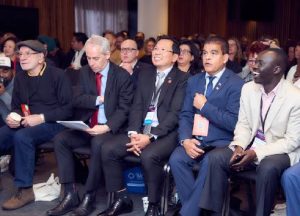RCAA conference hears call for higher refugee intake
Australia’s refugee intake should rise to 50,000 people a year, a major refugee settlement conference has heard.
 In her opening address to the inaugural Annual Conference of the Refugee Communities Association of Australia (RCAA), the CEO of settlement agency AMES Australia Cath Scarth said that with the Australian Government expanding the humanitarian intake to 20,000, a bold aim would be to resettle 50,000 refugees.
In her opening address to the inaugural Annual Conference of the Refugee Communities Association of Australia (RCAA), the CEO of settlement agency AMES Australia Cath Scarth said that with the Australian Government expanding the humanitarian intake to 20,000, a bold aim would be to resettle 50,000 refugees.
Ms Scarth said this could be achieved through strong commitments, while also positioning Australia as a global humanitarian leader.
Ms Scarth was speaking as she highlighted AMES Australia’s 75-year role supporting migrants and refugees to contribute economically and socially.
Meanwhile, the conference’s report has outlined a raft of other suggestions to improve the lives and integration of people from refugee communities.
The conference, which was staged around the theme of ‘Building on the Foundation of Lived Experiences’ brought together refugee communities to initiate ongoing dialogues, share insights, and enhance the capacity of those with direct experience.
The two-day Melbourne conference brought together more than 260 delegates representing a diverse range of settlement service providers, community leaders, academics, government officials as well as people from refugee backgrounds.
The conference report called for “tangible actions to bridge gaps between rhetoric and implementation” with the aim of creating a “more inclusive and equitable society for refugees and migrants in Australia, where policies and practices are collaboratively designed to genuinely uplift and integrate refugee communities”.
Among the recommendations is developing ‘holistic settlement policies’ amounting to “comprehensive settlement policies in collaboration with refugee communities, prioritising employment, education, housing affordability, access to services beyond social welfare and health services and other crucial needs identified by refugee communities”.
Also among the recommendations is the establishment of ‘ethical storytelling platforms’ which would prioritise cultural humility and trauma-informed practices, empowering refugees to share their narratives authentically, foster healing and understanding.
Another recommendation is ‘active refugee participation’, which would promote discourse recognising refugees as active contributors to society participants.
The report also recommends for using sport as a means of social inclusion “through advocating for diversity promotion within sports and challenging exclusionary attitudes”.
Also, among the recommendations are support for grassroots advocacy initiatives such as advisory boards and participative platforms and resource redirection which would see funds redirected from deterrence measures towards solutions that harness refugee skills and expertise for mutual benefit, fostering a sense of belonging.
Yet another recommendation was ‘gender-inclusive programming’ “tailored to the intersectional needs of migrant and refugee women, addressing systemic barriers and providing targeted support”.
The report also recommends the creation of ‘intersectional support frameworks’ covering housing, mental healthcare, education and linguistic accessibility addressing systemic access gaps for minority groups.












